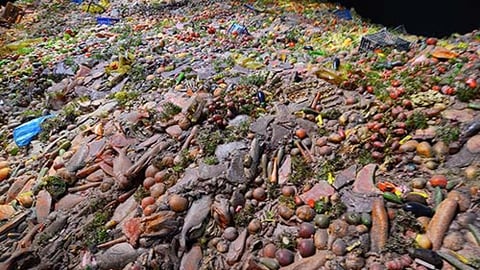Here’s How We’ll Win the War on Food Waste
The reasons for combating food waste are plentiful, and obvious. The numbers tell a daunting tale. The U.S. Department of Agriculture (USDA) and the Food and Agriculture Organization (FAO) of the United Nations estimate that up to 40% of food worldwide is wasted. In the United States, as with other developed nations, that number is likely even higher.
With the COVID-19 pandemic disrupting the grocery industry, reacting to variables in supply/demand, overcoming supply chain interruptions, and adapting to unprecedented and immediate public health challenges are the front-and center concerns for grocers. Therefore, solving for food waste may be seen as today’s pressing issue.
However, with dire economic circumstances impacting huge swaths of the population – with many experiencing food insecurity for the first time in their lives – food waste is an issue to focus on, and with a sense of urgency. It is no longer just about taking leftover food and looking for ways to put it to good use. It is about effecting change to help people who need it, even today. With crisis comes opportunity.
From our perspective as futurists, with clients that include some of the largest, most well-known CPG food brands, we think about food waste along every step of the chain. And we consider what are the changes that can be made to reduce waste?
Education and Awareness
The first order of business is education. Many grocers and suppliers do not have an accurate understanding of the legal risks involved. There is a common perception, that donating food exposes retailers to lawsuits if someone on the receiving end becomes ill. In 1996, Congress passed the “Bill Emerson Good Samaritan Food Donation Act”. The Act protects grocers from civil and criminal liability when donating food that “may not be readily marketable due to appearance, age, freshness, grade, size, surplus, or other conditions.” According to the express terms of the Act, “if a food donation that was made in good faith later causes an injury, the donor will not be held liable for that injury.”
The food industry needs to continuously inform and educate ourselves on this topic; The Act was “news” 24 years ago, which is before many grocery professionals entered the industry, so we shouldn’t assume it is widely known about, or understood. In an ever-increasingly litigious society, unless the Act gets continuous discussion and visibility among industry outlets and at conferences and events, the default strategy will be risk protection, which will undoubtedly contribute to more food waste.
Technology Solutions
While a traditional brick-and-mortar grocer can take unsold fresh meat, seafood and produce and turn it into hot bar and prepared food items, pandemic-era dark stores, warehouse operators and larger grocery delivery companies simply don't have that same flexibility. As the pandemic fuels the continued rapid growth of this sector, a prime opportunity is created to consider (and solve) the reverberations and follow-on impacts grocery e-commerce may have on waste generation throughout the supply chain.
Armed with an MBA from MIT, after stints with Deloitte and the U.S. EPA, Ricky Ashenfelter launched Spoiler Alert, a Boston-based software company that helps food businesses manage unsold inventory. They work with some of the biggest names across the food manufacturing, distribution and eCommerce ecosystem, helping them with software designed to identify sources of shrink and excess across all points in their operations, and tap into local, regional and national donation networks and discount channels.
According to Ricky, it is important to consider the impact of e-commerce on potential waste generation. He notes that, “While on-demand grocery delivery and pre-portioned meal kit solutions can have the effect of reducing consumer waste in the household, we need to recognize and address the fact that as a result, the burden of reducing food waste is not going away. It is simply moving higher up the supply chain - where suppliers are facing meaningful volatility in demand forecasting, shortages, and overages”
Another aspect of food waste where COVID-19 has highlighted some issues is the model where grocers provide non-sellable or otherwise unused inventory to food banks and food pantries, where the food “waits” to be distributed or delivered to those in need. Goodr, another technology startup that aims to reduce food waste, uses a mobile app to connect businesses with local food banks and charities to facilitate deliveries of unsold or unused food. Goodr aims to solve the lack of predictability around excess food. Grocers and other food businesses use the app to let local-non-profits know when they have excess food to offer and help them get access to it by leveraging a network of third-party logistics partners, which can include everybody from DoorDash to Roadie to Uber Eats drivers.
Through underlying blockchain technology that tracks food waste, Goodr enables grocers to generate and collect valuable data behind the excess food, and eventually analyze the data to solve inefficiencies and fix issues that lead to excess food. The idea behind Goodr is to use technology to go beyond wasted food use, and eventually reduce and even eliminate excess food from the outset.
The pandemic is presenting the grocery industry with a golden moment to focus efforts to combat food waste, which will help people today and undoubtedly pay off further once some semblance of normality returns.







